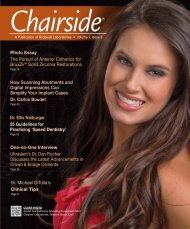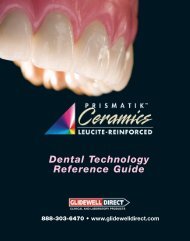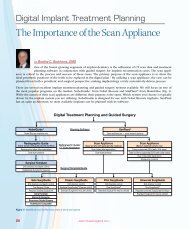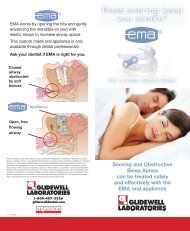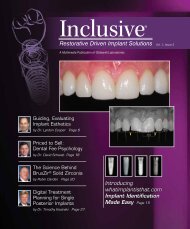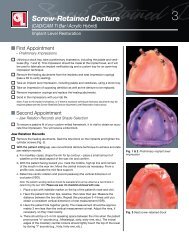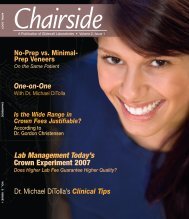PDF Version - Glidewell Dental Labs
PDF Version - Glidewell Dental Labs
PDF Version - Glidewell Dental Labs
You also want an ePaper? Increase the reach of your titles
YUMPU automatically turns print PDFs into web optimized ePapers that Google loves.
that should give them concern. We probably have a better<br />
knowledge than the dentist of what embezzling behavior<br />
looks like.<br />
Once we mutually decide that an investigation should<br />
happen, the next thing we do is obtain their computer data.<br />
We don’t like to work on the dentists’ computers because<br />
they’re live systems and stuff is constantly changing. Plus,<br />
if we’re connected remotely to a dentist’s computer, there<br />
is a reasonable possibility that the staff member might<br />
realize what we are doing. One thing that we emphasize<br />
to every dentist we deal with is that an investigation has<br />
to be stealthy. The staff cannot know that you are doing an<br />
investigation until the process is complete and you have<br />
an answer. Because if you think there is fraud when there<br />
isn’t and you let the employees know that, you’ve destroyed<br />
the employment bond and rebuilding it will be close to<br />
impossible. On the other hand, if there is embezzlement<br />
going on, you want to spring a trap on the thief as opposed<br />
to the other way around. So stealth is important. What<br />
we do is we get a complete copy of someone’s practice<br />
management software data. So if you’re using Dentrix ®<br />
(Henry Schein; American Fork, Utah), for example, there<br />
is a folder on your server that has all the data. We get it<br />
and bring it into our computer lab, where we analyze it<br />
using our copy of Dentrix and look for patterns that are<br />
consistent with embezzlement.<br />
MD: Once you’ve identified that there might be some embezzlement<br />
going on, do you set the trap at that point? Or do you<br />
have to have another occasion or two to be able to make a<br />
strong case?<br />
DH: No, most of the time at that point we can see what<br />
has gone on. A lot of times we’re helped by third parties.<br />
For example, if we see a situation where there was money<br />
billed to an insurance company but the money didn’t come<br />
to the practice. Then we can go back to the insurance<br />
company and ask where the check went. If it went into the<br />
receptionist’s bank account, then we know.<br />
We also look at login names on the computer and who<br />
is logged into the practice management software. We also<br />
check if someone is coming and going at strange hours and<br />
if there is either an alarm system in the office or if there<br />
is some kind of building log that tracks access. If we can<br />
correlate transactions to a specific person’s access, then we<br />
have them. One message I’ll give your readers is that it is<br />
really important to have individual logins for your practice<br />
management software. Some offices have what I call the<br />
“unicode,” a single code that everybody uses to log in with,<br />
which makes it very tough for us to track who is doing the<br />
dirty stuff.<br />
DH: I highly doubt it will stop anybody from stealing, but<br />
it will make the job of pinning their hide to the wall far<br />
easier afterward. I’ll say the same thing about alarm systems<br />
in the office. I go into a lot of offices where there is one<br />
code that everybody in the office uses, including the office<br />
cleaners that were fired who used to work there three years<br />
ago. It’s important that everybody has their own unique<br />
login code for the alarm system, and that they are changed<br />
periodically. Because it stops employees from scooping up<br />
someone else’s code by watching over their shoulder when<br />
they’re entering it.<br />
MD: That is another great tip. I love your example about the<br />
office cleaners who were fired three years ago. I would present<br />
individual login codes to the staff as a protection measure<br />
against outside theft more than internal theft, but also suggest<br />
that they keep the codes to themselves regardless. That way<br />
people aren’t looking at one another wondering who is stealing<br />
from the office or thinking that is why the practice is going<br />
through all the security trouble.<br />
So if a dentist does think something funny is going on in their<br />
office and they want to give your company a call, what is the<br />
best way for them to contact you?<br />
DH: We have one e-mail address that we refer to as the<br />
“embezzlement hotline.” The e-mail address is emergency@<br />
dentalembezzlement.com. We have an on-duty fraud<br />
investigator 365 days a year, and that e-mail address<br />
is monitored by whoever is on duty. So if you send an<br />
e-mail to that address on a Sunday, you will typically get<br />
a response the same day from an investigator who will<br />
say, “Let’s find a time when you are able to speak freely,<br />
and go from there.” We also have a phone number and<br />
other e-mail addresses, but the absolute best way to get<br />
in touch with us if you have embezzlement concerns is<br />
emergency@dentalembezzlement.com.<br />
MD: Any tips about where they should be sending that e-mail<br />
from, just in case the embezzler is going through their e-mail?<br />
DH: If they’re not sure about their e-mail security, the best<br />
advice I can give your readers is to set up a new Hotmail<br />
or Gmail account and send it from there. Just because we’ll<br />
know that one is secure. CM<br />
For more information, contact David Harris at 888-398-2327 or by visiting<br />
www.dentalembezzlement.com. For immediate concerns about potential dental<br />
fraud being committed in your office, e-mail emergency@dentalembezzlement.com.<br />
MD: Individual logins seem like a good preemptive thing to<br />
have in place, so employees know that anything they do on the<br />
computer is going to be able to be traced back to them.<br />
Interview with David Harris53



